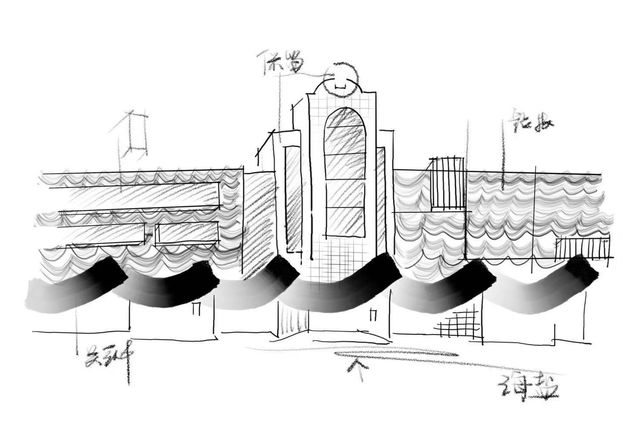
Haiyan Intangible Cultural Heritage Museum
LYCS Architecture
Project Name: Haiyan Intangible Cultural Heritage Museum
Location: Jiaxing City, China
Design Team: LYCS Architecture
Principal Designers: Ruan Hao, Zhan Yuan
Collaborating Design Institute: Zhejiang Baoye Architectural Design and Research Institute Co., Ltd.
Building Area: 7,211 m²
Completion Date: 2024
Client: Haiyan Urban Construction Investment Development Co., Ltd.
Photography: LYCS
Feature:
Project - In a remarkable fusion of industrial heritage and cultural preservation, LYCS Architecture has unveiled the Haiyan Intangible Cultural Heritage Museum, a sophisticated adaptive reuse project that breathes new life into a former power meter factory in Zhejiang Province, China. The 7,211-square-meter development masterfully balances exhibition spaces, boutique accommodation, and commercial areas while paying homage to the site's industrial past.
The project's most striking feature is its innovative façade treatment, where curved perforated aluminum panels create a rhythmic interplay of horizontal lines and vertical elements. This contemporary skin wraps around the existing structure, initiating a dialogue between old and new that defines the project's architectural approach. The original factory entrance, preserved for its distinctive industrial character, serves as a historical anchor within the modernized complex.
At the heart of the development, LYCS has meticulously reconstructed the historic "Double Pool Impression" landscape, a significant cultural landmark in Haiyan's history. This water feature is thoughtfully integrated with elements of intangible cultural heritage, such as traditional rolling lanterns, creating a dynamic sequence of views that draws inspiration from classical Chinese garden design principles.
The architects employed a sophisticated "composite renewal strategy" encompassing demolition, restoration, preservation, and insertion. A particularly noteworthy addition is the "historical corridor" at ground level, which takes its cues from traditional local residences. This architectural element effectively connects the heritage museum, historic façades, and boutique accommodations while referencing the vernacular architecture of Haiyan through its continuous gabled walls.
The project's location at the intersection of Wenchang West Road and Qiyuan Road positions it within a cultural cluster, adjacent to significant attractions including the Qiyuan Garden, the Zhang Leping Memorial Hall, and the Haiyan County Museum. This strategic setting reinforces the development's role as a crucial node in the area's cultural infrastructure, while demonstrating how thoughtful architectural intervention can revitalize industrial heritage for contemporary cultural purposes.
Design Team - Founded in 2011, LYCS Architecture has established itself as one of China's most progressive architectural practices, earning recognition as one of ArchDaily's top emerging Chinese design firms and BUILD Magazine's Most Innovative Design Studio. Under the leadership of founding principal Ruan Hao and partner Zhan Yuan, the practice has evolved into a multidisciplinary powerhouse with offices in Hangzhou and Hong Kong, serving clients across 40 cities globally.
The firm's design philosophy centers on addressing the complexities of high-density urban environments through innovative spatial solutions. With a team of over 100 professionals, LYCS has garnered international acclaim for its groundbreaking projects, including the first rooftop running track design for a Chinese elementary school, which was featured in The New York Times. Their portfolio spans diverse typologies, from adaptive reuse and cultural facilities to commercial complexes and educational institutions.
LYCS's commitment to sustainable design is evidenced by their LEED and WELL-certified professionals who integrate environmentally conscious strategies into every project. Their research-driven approach combines rigorous technical expertise with creative exploration, resulting in designs that push the boundaries of contemporary architecture. Notable accolades include the China Architecture Society Young Architect Award, AD100 China's Most Influential Architecture and Interior Design Elite, and multiple A+ Awards.
The practice maintains a strong academic connection through collaborations with universities and research laboratories, focusing on user behavior studies, high-density urban architecture, and material innovation. This scholarly approach, combined with their practical expertise, positions LYCS at the forefront of architectural innovation in Asia's rapidly evolving urban landscape.
7211 m²
Jiaxing City, China
2024






















